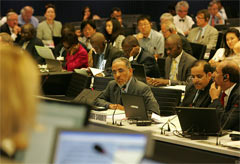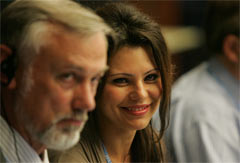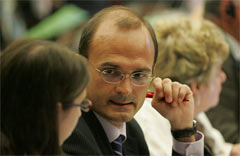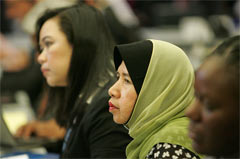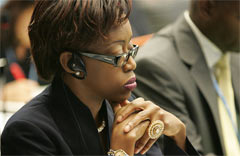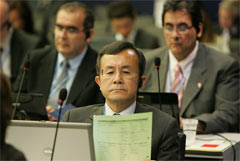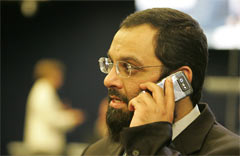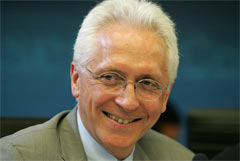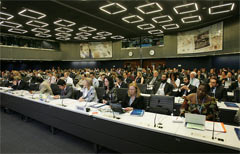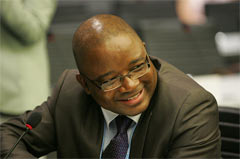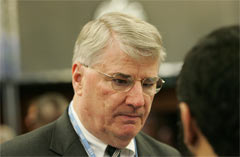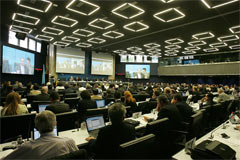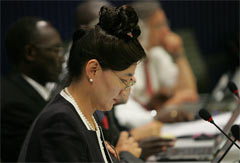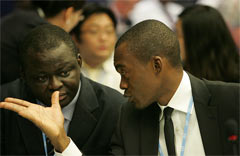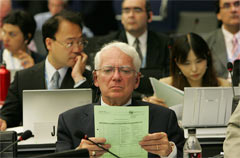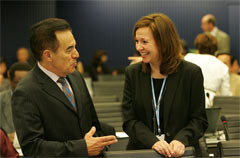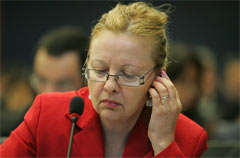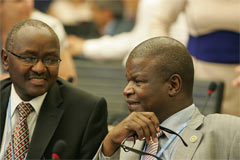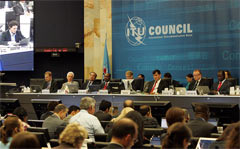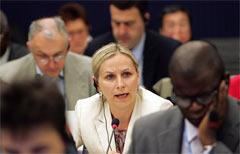
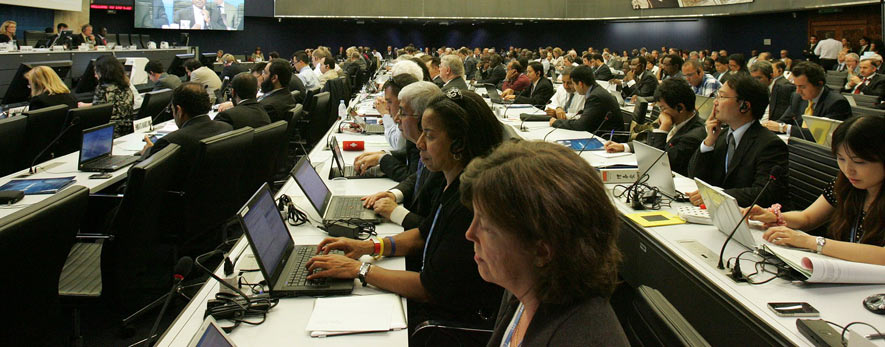
| « Previous | Next » | |||||||||||
| Issue No. 3 | Geneva, 9 July 2012 | |||||||||||
|
|
||||||||||||
Council in PlenaryWhat WRC-12 decisions will cost ITU
The Council noted that the financial implications of the decisions of WRC-12 amounted to CHF 1.1 million and, as suggested in Document C12/42 presented by Fabio Leite (BR), agreed that this cost should be covered by efficiency measures and savings. It also noted that efficiency would be improved by using the electronic communication methods based on WRC-12 Resolutions 907 and 908, and by hosting outside Geneva the meetings of the ITU-R groups called upon to implement WRC-12 Resolution 233. Although it had not been envisaged in the proposed approach, some Member States stated that the use of the Reserve Account to finance the implementation of these Resolutions should not be considered. World Radiocommunication Conference 2015
The Council has resolved to hold the next Radiocommunication Assembly and World Radiocommunication Conference (RA-15/WRC-15) in Geneva, on 26-30 October and 2-27 November 2015, respectively. The agenda of WRC-15 as proposed by WRC-12 was also adopted. But, as usual, final approval of the agenda, venue and dates are subject to the concurrence of a majority of the Member States of the Union. Several councillors suggested that these events should be held somewhere with a warmer climate than Geneva. Cost recovery for the processing of satellite network filingsIn line with the instructions of the 2011 session of the Council, the Secretary-General had brought to the attention of WRC-12 the summary of discussions on the establishment or otherwise of an annual cost recovery fee for assignments in the ITU Master International Frequency Register (MIFR). Two documents were presented on this issue: Document C12/38, presented by Yvon Henri (BR) and Document 12/78, presented by India. Many Member States said they were opposed to the introduction of an annual fee for the maintenance of the MIFR, arguing that there is no need to change a system that works well. In other words, “if it ain't broke don't fix it!” Several others considered that an additional fee could have a negative impact on developing countries – a two-tier fee plan had been proposed for developing and developed countries. Taking note of these, and of other comments, and as proposed in Document C12/38, it was decided that the Council would come back on the matter at a future session. Both documents were noted.
With regard to access to spectrum/orbit resources, WRC-12 had made a breakthrough by taking regulatory steps to prevent a situation of apparent congestion in these resources resulting from the existence of rights which are not being used in practice. These WRC-12 provisions enter into force on 1 January 2013, and time is needed to assess their impact on access to spectrum/orbit resources. Keeping the options open: ITU’s possible role under the draft Space Protocol
Yvon Henri (BR) presented Document C12/36, following up the Council’s discussions in 2011 on the possible role of ITU as supervisory authority of the future international registration system for space assets under the draft Space Protocol, and reporting on the diplomatic Conference held in Berlin from 27 February to 9 March 2012.
Sector membership
The Council confirmed seven “entities dealing with telecommunication matters as Sector Members” (Document C12/33). Each year, the secretariat receives requests by such entities, which can be granted the right to participate by the Secretary-General on a provisional basis until confirmation by the Council, explained Doreen Bogdan-Martin presenting Document C12/33. Free online access to ITU publicationsThe Guadalajara Plenipotentiary Conference expanded the free online access policy to include ITU-R Recommendations and reports, among other publications. According to Document C12/26, presented by Shafqat Zaidi (General Secretariat), the number of downloads and number of distinct users downloading these publications has increased markedly. Thus, the free online access policy has brought ITU standards within the reach of a broader public, especially in developing countries with financial constraints. The wide outreach via free online access will help build the visibility of ITU’s mission and mandate and reinforce ITU as a global telecommunication authority. In Resolution 66 (Rev. Guadalajara, 2010), the Plenipotentiary Conference also approved a two-tier pricing policy allowing the Sales & Marketing Division to set market prices for ITU publications in order to maximize sales revenue. Several publications are now being sold at a market price, with a lower price being offered to ITU members. As a result of several sales development programmes during the year, sales results are encouraging delivering CHF16.3 million in 2011. The introduction of several ITU publications in CD-Rom format has been very successful, and users have come to understand the various benefits of a digital version vis-à-vis paper. Paper sales have now become a smaller proportion of overall sales, currently 21 per cent of total sales of ITU publications (compared with 91 per cent in 2010), reducing production and delivery costs, as well as being environmentally friendly.
The Russian Federation and Brazil pressed for making the Radio Regulations free to the general public, an approach supported by several delegates. Saudi Arabia and the United Arab Emirates did not support that idea, however, and suggested that the proposal from Brazil and the Russian Federation should be thoroughly studied before any decision is taken, in order to understand the impact this action might have on the financial health of the Union.
Arnaud Guillot (ITU’S Legal Advisor) explained that Member States have a legal responsibility to make documents freely accessible to all of their constituents, particularly those parties who are legally bound by the rules and regulations set forth therein. Responding to a proposal to remove the ITU copyright from ITU texts, Mr Guillot stated that “ it would be very dangerous and not at all prudent to do so”, and referred to Resolution 66 which reaffirms ITU’s right and obligation to retain a copyright. Standing Committee on Administration and Management (ADM) completes its work
The ADM Committee completed its work on Monday, 9 July, having examined all the documents on its agenda Financial operating report for 2011
Continuing the discussion from where it left off on Friday (6 July), the ADM Committee recommends that the Council approve the Financial Operating Report on the audited accounts (Document C12/3). Closing the accounts for 2012-2013
Resuming the discussion that started last Thursday (5 July) on the annual review of revenue and expenses (Document C12/9(Rev.1), some delegates queried the projected deficit and the request for a withdrawal from the Reserve Account to balance the 2012-2013 accounts. Staff Superannuation and Benevolent FundsThe Staff Superannuation and Benevolent Funds (SSBF) of the ITU – established in 1960 – groups together the pension funds of personnel affiliated before 1 January 1960. A Management Board of six members administers the Funds. The ITU SSBF membership is made up of retired members and survivors, but no longer includes any member in active service. The membership of the SSBF is gradually decreasing and the average age of the beneficiaries has reached 87 years. Under these circumstances, the Secretariat of the Board has difficulty finding new representatives of the retired members to fill vacancies on the Board. For these demographic reasons, the Board is proposing to reduce its composition to four titular members (replaced, when necessary by alternates) as follows: two representatives from the retired members, and two appointed representatives of the Secretary-General.
Having considered this request and the sound financial situation of SSBF highlighted in Document C12/47, the ADM Committee recommends that the Council adopt the amendments to Article 87 of the Statutes of the Staff Superannuation and Benevolent Fund Statutes – Management Board as outlined in an Annex to that document. Changes in the conditions of service under the UN Common System
The Standing Committee took note of the changes to the relevant provisions of the Staff Regulations for appointed officials in regard to the conditions of service of staff members in the Professional and higher categories, implemented by the Secretary-General in conformity with Council Resolution 647 (amended), and on the basis of decisions taken by the United Nations General Assembly adopted on the basis of the recommendations presented by the International Civil Service Commission (ICSC). Statement by the Staff CouncilIn accordance with Resolution 51 (Rev. Minneapolis, 1998) of the Plenipotentiary Conference, Ms Anna Khristich, Vice-Chairman of the Staff Council, made a statement confirming that the dialogue existing with Management continues to be strong and productive.
The Chairman of the ADM Committee expressed appreciation to both the management and the Staff Council for their very good and constructive dialogue and renewed its support towards a continued strengthening of that dialogue. Not an official document – For information only. |
|
|||||||||||
